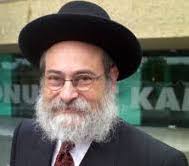Shvuos 5780: Vision of Rabbi Jacobs
Chief Rabbi Binyomin Jacobs shares his vision in these complicated times from the synagogue in Amersfoort.
Judaism has many traditions and laws. But there is one law that remarkably doesn’t fall under the 613 commands and prohibitions. It just doesn’t exist and that is the prohibition on being depressed. What I mean is there are people that see everything darkly. They see everything in a negative way and don’t look for the positives. They always focus on the negative side. So why is there no law against this?
The answer to that question is, being depressed is not a violation but it stands higher (or lower) in a way than a regular law. Because it leads to the biggest of violations. This perspective looks at everything that can go wrong. It’s like only looking at the negative potential side-effects of medicines and forgetting that the purpose of the medicine is to cure.
Such a way of life is not only one violation but is also the root for a lot of misery in mental health. And because body and mind are connected, it also has effects on your body. A negative and depressed attitude is a source of misery, mental and physical.
I wrote a column once about a tightrope walker. A tightrope walker shouldn’t look only upwards and blindly trust in the Eternal that all ‘it will be alright.’ But equally only to look down into the abyss is not good.
There is a happy medium. A balance between up and down. Otherwise the tightrope walker will never make it to the other side.
In a way we are all tightrope walkers. All the time we need to find a balance between the Eternal and the fact that there is indeed an abyss.
Another point: A man grows up in the jungle. He knows nothing of the civilised world. His view never got further than the trees and the jungle. His jungle. This man gets lost and arrives in a city. He looks at everything. He walks around surprised. He walks into the door of a big building into the hallway, walks up the stars and goes unto the balcony. Below him he sees a large room. In that room men and women walking around with face masks on. On the wall he sees tools, saws, drills and more instruments.
In the middle of the hall stands a high long table. On that table lies a white sheet. Under that sheet a human foot stick out. A nod is given, and some men and women start to cut into it. Blood sprays out and our man from the Jungle passes out. He has never seen something so sadistic. Of course, he ended up in the operating room of a hospital. The person on the table, in the hospital bed, was sick and was being cured by the doctor and the nurses. Our man sees only the painful surgery. He does not know the context that that the patient was sick and is being cured by this surgery.
Life is like surgery. There is something before and something after. But if we only witness the surgery then that’s the only thing we see. What there was before and what comes after, removes itself completely from our vision.
More than ever, today we all feel that we are undergoing surgery.
Is it a punishment? A reward? Meaningful? Meaningless? It’s always good to keep a mirror in front of yourself. But to firmly embed yourself into feelings of guilt, putting yourself into a depressed condition, that should never happen.
We cannot understand life like our man from the Jungle.
Serve G-d with joy. Are we able to do that? Or a better question: can I do that?
A parable is told of 2 strong cool guys (someone like me). Both are standing at the foot of a mountain. Both have an empty burlap sack on their shoulders. The contest can start. The starting gun is fired and both guys need to, while climbing, fill their sacks with rocks. After 3 hours they have a same amount of rocks in their sacks. Both climbed to the same height. But one is pale and cannot clime any higher.
The other is singing with joy and walks with big steps. How is this possible? That one is so heavily burdened but the other does not feel it? Both have the same health and strength. Both have the same amount of rocks in their sacks. But the guy that cannot climb a single step further thinks he is carrying kilos of stupid rocks. The more rocks he is collecting, it gets heavier and heavier.
His buddy knows that it is not just rocks. Its precious stones and diamonds. The more diamonds he gets into his sack, the lighter and lighter it gets.
How do I choose to look at all the things that I am enduring in my life?
When I’m speaking to a lot of people as a rabbi, I learn a lot. People are in situations that are heavier than mine. But they take every load as a diamond. I learn from their strength and self-control. They hold a mirror in front of me.
That is Judaism. To learn from someone else. And it’s also Judaism to see the heavy load not as it is.
It’s also Judaism that when you notice an unexpected a shortcoming in someone else, you are aware that it also can be present in you. If you did not know that this shortcoming was what it is, you would not recognize it in yourself. And at the same time, alertness.
Alertness of the rise in antisemitism that is far from vanished and vanquished. Our minister of Justice and Security is also Minister of Worship. And when I spoke to him about restarting our worship, he warned me about the lone wolf. Especially during the pandemic. But it is also, alertness to the physical rules that should protect us against that terrible virus. When we can go to shul, the church or the mosque, we shouldn’t just trust that everything will come from above. Because when that tightrope walker only looks up, he won’t make it.
On Thursday we start the holiday of Shavuot. The Jewish people stood as one at the foot of the Sinai to receive the 10 commandments, the 613 mitzvot and the Torah in its totality. They saw G-d. There was something in common and that brought them together. There was unanimity. For division, fights and tensions there was no room.
In this time of Coronavirus, it is not only the Jewish people that have something in common, but the whole of humanity: a common enemy. From it we should liberate ourselves. But it’s an enemy of everyone, without any form of discrimination.
Let us pray that that enemy will be beaten in our days, exterminated and that the unanimity that the virus has made, will stay.
May there be speedily in our day’s eternal shalom – peace – for the whole of humanity, real peace for everyone.






